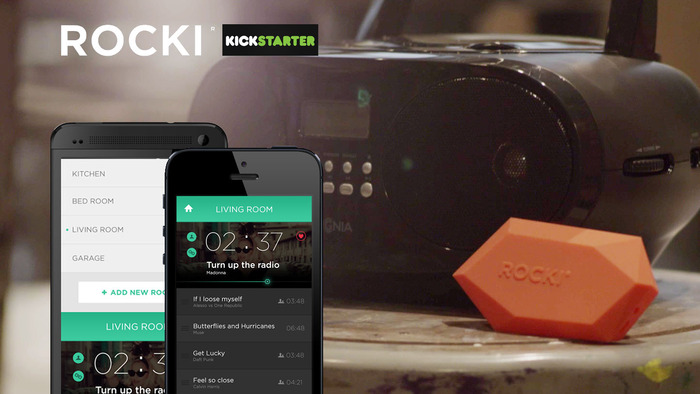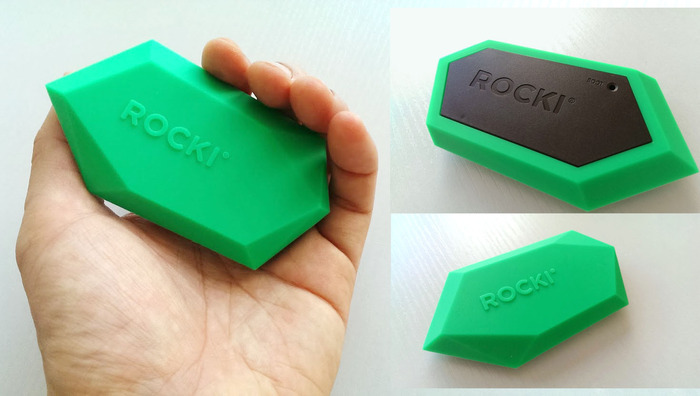Rocki | The Music Satellite For Your Life
 I admit. I’m a gadget geek, but not in the traditional sense. For me the warm feelings from stumbling across new tech stems from something distinct – not quite external validation, or the compulsory drive to have the newest things (#BlackFridayNeverAgain). Instead, it comes from discovering awesome gadgets that really resonate with my personal lifestyle.
I admit. I’m a gadget geek, but not in the traditional sense. For me the warm feelings from stumbling across new tech stems from something distinct – not quite external validation, or the compulsory drive to have the newest things (#BlackFridayNeverAgain). Instead, it comes from discovering awesome gadgets that really resonate with my personal lifestyle.
The key moment: When you go from wishing something existed to actually finding it. And therein lies the difference between having a product that gets seldom use vs having one that sticks with you for a while. As I’ve discovered, Rocki is the latter.
Music Is Kind of a Big Deal to Me
As a self proclaimed beat junky, I get kid in a candy shop excited when I find things that promise better/easier access to my music collection. But for how much I claim to love immersing myself in treble and bass, I do find it odd that I haven’t bought my way into the musical side of the Internet of Things (IOT) world.
(Generally speaking, this means no SONOS ecosystem).
No offense to SONOS of course. I’m a believer in their work as front runners in the connected audio space. But as of yet, my personal needs as a consumer hasn’t quite driven me to the big $200-400/room buy in to create a personal network of interconnected audio receivers. Why?
So far, nothing in the connected audio space remotely matches the bang-for-the-buck audio output of my comically bassy, earth shattering, borderline obscene Logitech Z23’s. If you’re like me, I’m sure you have a set of speakers that you feel the same way about: 5+ years old, hard working mules that you just won’t let you down. So if you’ve been stubbornly holding on to your aging tech and wishing for a way to give it a boost of connective flexibility, that’s where Rocki comes in.
Music, Anywhere in Your Home
As we know, the Internet of Things (IOT) world has been a hot topic of discussion this year, and for good reason. From huge acquisitions to fast moving VC deals and product development (hardware + software), it appears as if we’re at the starting line of a connected home future.
But for all its promise, at least music-wise, I’ve found that I would still rather run a clumsy cord to my speakers than deal with lesser audio output. And somehow, I’m confident others like me exist: Audio consumers who want an easy, affordable (looking at you Apple) solution to play their favorite music over a wireless network.
And the source of my confidence in knowing others share my pain?
A(n Overwhelming) Kickstarter Success
As of December, 2013, Rocki was successfully funded at more than 4x the amount of their $50,000 goal. The grand total: $222,197 with the help of 2,362 backers. A strong, passionate community to say the least.
How it works: Simplistic in design and function, Rocki turns any pre-existing audio set up into a WiFi enabled receiver at $60 a pop. Streamlined for an easy set up experience, one simply needs to plug the 3mm audio cable that would have been meant for their phone, laptop, etc., then set the receiver up through Rocki’s Android app.
For iPhone users, the native app will be available in Summer 2014 – for now, you can set up your system through Airplay.
Inspired Through Music
The founders’ story behind Rocki started with Nick NM Yap and Dennis List in February, 2013. Both founders had been a driving force behind a successful audio/video media player hardware company. And while their industry peers were focused on streaming video, the music passionate pair always felt the audio streaming industry was overlooked and underdeveloped. Especially given the technology available at hand.
With their know-how in the audio/video streaming space, Nick and Dennis moved forward with their dream to make products in the music + technology space. And in wanting to separate themselves from other companies who were fixated on developing WiFi speakers, Rocki was was born. The dream? To make products that enabled any speakers to have Wifi and multi-room connectivity.
My Time with Rocki
1) First Impressions and Set up – My personal experience with Rocki was pretty seamless. The simple plastic unit came in a variety of silicon skins for customizability. That, with its pocketable size and quirky form factor (looks like a colored crystal from afar) had plenty of people begging to ask about its origins.
For my set up (iPhone through Airply), the process took the better part of five minutes with one simple read through of their onboarding instructions.
2) Music Play – Ongoing reliability was admittedly spotty at times (one or two connection hiccups per hour of music play) by I strongly attributed that to a spotty WiFi set up at home. For further testing, I took the Rocki on the road to set it up at two friends’ apartments and found little to no issues. Clarity wise, no problems :).
3) Added bonuses: Music play can be set up with multiple users for a collaborative play for a connected juke box experience. It also keeps track of your play history so you can always refer back to what you and your friends were playing.
Overall, I’ll give a green light to the Rocki for their easy implementation and allowing me the ability to keep my current audio set up. We were told the founders went with this decision during the product development process to be able to appeal to a much larger market of people (rather than pigeon-hole themselves into specific targets and niches with their own proprietary line of audio speakers). To make purchasing easy, you can buy the unity from them direct. They also have plans to partner with major distributors like Amazon by mid 2014 and retail stores in the 2nd half of 2014.
And the most interesting part? For the savvy hackers out there, the Rocki software runs on an open source system with an API that is accessible upon developer request. I for one can’t wait to see what the community comes up with.
For more information on Rocki, be sure to visit their main website here!













